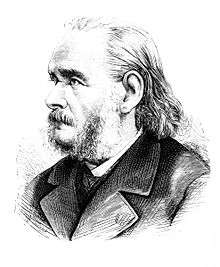Matthias Jakob Schleiden
| Matthias Jakob Schleiden | |
|---|---|
 | |
| Born |
5 April 1804 Hamburg, Holy Roman Empire |
| Died |
23 June 1881 (aged 77) Frankfurt am Main, German Empire |
| Nationality | German |
| Institutions | University of Jena, University of Dorpat |
| Alma mater | Heidelberg |
| Known for | Cell theory |
| Author abbrev. (botany) | Schleid. |
Matthias Jakob Schleiden (5 April 1804 – 23 June 1881) was a German botanist and co-founder of the cell theory, along with Theodor Schwann and Rudolf Virchow.
Born in Hamburg, Schleiden was educated at University of Jena, then practiced law in Heidelberg, but soon developed his love for the botany into a full-time pursuit. Schleiden preferred to study plant structure under the microscope. While a professor of botany at the University of Jena, he wrote Failures to Contributate to Phytogenesis (1838), in which he stated that the different parts of the plant organism are composed of cells. Thus, Schleiden and Schwann became the first to formulate what was then an informal belief as a principle of biology equal in importance to the atomic theory of chemistry. He also recognized the importance of the cell nucleus, discovered in 1831 by the Scottish botanist Robert Brown,[1] and sensed its connection with cell division.

Schleiden was one of the first German biologists to accept Charles Darwin's theory of evolution. He became professor of botany at the University of Dorpat in 1863. He concluded that all plant parts are made of cells and that an embryonic plant organism arises from the one cell. He died in Frankfurt am Main on 23 June 1881.[2]
References
- ↑ Trisha Creekmore. "The Science Channel :: 100 Greatest Discoveries: Biology". Discovery Communications. Retrieved 2006-10-17.
- ↑ Mathias Jacob Schleiden, Encyclopædia Britannica
- ↑ IPNI. Schleid.
External links
- Short biography and bibliography in the Virtual Laboratory of the Max Planck Institute for the History of Science
- Schwann, Theodor and Schleyden, M. J., Microscopical researches into the accordance in the structure and growth of animals and plants. London: Printed for the Sydenham Society, 1847.
 Chisholm, Hugh, ed. (1911). "Schleiden, Matthias Jakob". Encyclopædia Britannica (11th ed.). Cambridge University Press.
Chisholm, Hugh, ed. (1911). "Schleiden, Matthias Jakob". Encyclopædia Britannica (11th ed.). Cambridge University Press. "year=1920". Encyclopedia Americana. 1920.
"year=1920". Encyclopedia Americana. 1920.- Ernst Wunschmann (1890), "Schleiden, Matthias Jacob", Allgemeine Deutsche Biographie (ADB) (in German), 31, Leipzig: Duncker & Humblot, pp. 417–421
- Author Query Results and Plant Name Query Results for Matthias Jakob Schleiden at the International Plant Names Index. Retrieved on February 18, 2009.
| Wikimedia Commons has media related to Matthias Jacob Schleiden. |